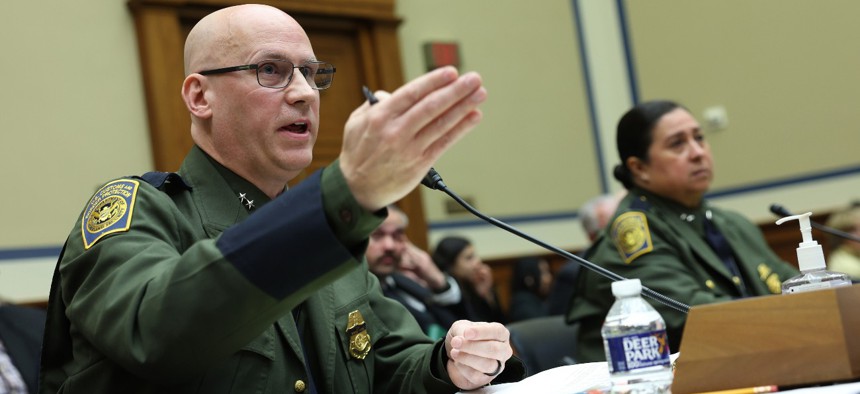
U.S. Customs and Border Protection Agents John Modlin (left), chief patrol agent of the Tucson Sector, and Gloria Chavez, chief patrol agent of the Rio Grande Valley Sector, testify before the House Oversight and Reform Committee on Tuesday. The committee held a hearing to investigate security concerns at the U.S. southern border. Kevin Dietsch/Getty Images
'I Do Not Have Enough Agents,' a Border Chief Tells Congress
At contentious hearing, all sides largely agree the southwest border needs more federal resources.
The federal government requires more personnel at the border to confront a rising level of migrants arriving there, Biden administration officials told lawmakers at a hearing on Tuesday.
The need for additional resources at the border was among the few areas of agreement during the contentious and politically charged hearing before the House Oversight and Accountability Committee. The testimony was the first from front-line border personnel before Congress since President Biden took office and marked a departure for an administration that has sought to largely downplay the situation in the southwest United States.
“I don’t have the correct adjective to describe what’s going on,” John Modlin, the Border Patrol’s chief agent in the Tucson sector, said of the unprecedented number of arrests his agents are making. The number of encounters in his sector has quadrupled since fiscal 2020, he noted.
Modlin added that Border Patrol currently has 19,300 employees, but needs around 22,000 to function properly. The Biden administration has touted that under the fiscal 2023 omnibus funding package, Customs and Border Protection will have funding for a total of 23,000 agents and officers at the border.
“Agency-wide, we recognize we need more people,” Modlin said. “I certainly know I do not have enough agents within Tucson sector to deal with the flow that we’re dealing with now.”
Gloria Chavez, the chief agent in the Rio Grande Valley sector, said she has made it a top priority to increase its government and contracted personnel to serve at processing centers. That allows agents to return to their front-line law enforcement duties, she said, adding her staff has been “a bit overwhelmed” in recent months. Modlin said he still has 20% of his law enforcement staff conducting processing work, but praised leadership for launching the processing centers that has increasingly allowed other employees to take that on.
The Biden administration has repeatedly deployed employees from within the Homeland Security Department and throughout government to help conduct that processing work and free up agents. Under the fiscal 2023 omnibus funding bill, Border Patrol received a 17% funding increase and authorization to hire 300 new agents. Congress also provided CBP a one-time appropriation of $1.6 billion to address the uptick at the border. Under President Trump, Border Patrol was largely unsuccessful in its efforts to dramatically ramp up its staffing. The latest funding represented the first increase for staffing since 2011.
Chavez and Modlin noted their personnel are additionally being squeezed due to resource and time-intensive operations, such as additional rescues and migrants crossing individually or in small numbers.
The hearing marked the first of what the new Republican majority promised would be many hearings on Biden’s border policies. Lawmakers repeatedly highlighted that Border Patrol encountered 2.4 million in fiscal 2022, an all-time record inflated by the expulsion policy known as Title 42 that allowed migrants to make repeated attempts to enter the United States. Tuesday’s meeting got off to a testy start after Democrats on the panel tweeted that Republicans were seeking to “amplify white nationalist conspiracy theories” rather than working toward a solution. Rep. James Comer, R-Ky., who chairs the committee, criticized Democrats for their accusation and said it could violate decorum rules.
Ian Sams, a White House spokesman, said in a memorandum ahead of the hearing that House Republicans were "staging political stunts" rather than working with Democrats to pass comprehensive immigration and border security. He accused Republicans of actively making the situation at the border worse by voting against increased funding to boost personnel and resources for CBP.
Addressing those comments, Comer countered that he was simply looking to provide oversight.
“Real oversight is not fanning flames,” Comer said.
Lawmakers debated a number of policy issues, including whether comprehensive immigration reform would alleviate the current strain on Border Patrol, if a surge in fentanyl interdictions marked a crisis or the border security system working as intended and whether Biden’s directives caused the uptick in migrant encounters. The Border Patrol officials both said wall infrastructure was helpful in directing flows of migrants and more barrier construction is needed. Modlin noted the construction alone would not be sufficient and CBP was working to address gaps left in technology and other resources.
Last month, Biden toured the border in El Paso and promised to fulfill the requests he heard from front-line personnel.
“They need a lot of resources, and we’re going to get it for them,” Biden said.
The White House may find a willing partner on that issue. While Comer told Government Executive after the hearing that Democrats and Republicans remain far divided on the severity of the situation, he expressed some optimism they could come together on funding.
“I hope so,” Comer said on whether he can work across the aisle. “Hopefully we can work [together] when we get the power of the purse and can and try to do something to secure the border.”







